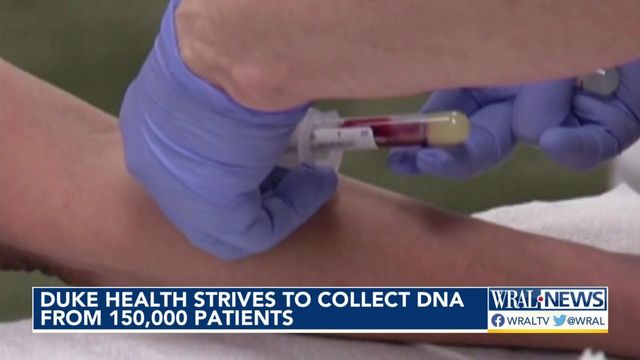'OneDukeGen' DNA study involves 150,000 Duke patients with a 'precision health' approach
Duke Health has begun major research to find out why some people stay healthy while others develop disease.
The 6-year study will gather DNA data from 150,000 Duke patients. The hope is that it may discover patients’ risk early enough to prevent disease.
Retired physician Lyn Means recently came for a visit with her Duke doctor. She said, "I was asked, 'Well, do you have anything scheduled after this?' I said, 'Nope.'"
Recently, Means came to Duke Health for an echo-cardiogram. While there, she said, "I was asked if I’d mind participating in a study." It involved collecting blood samples for genetic testing, which she was glad to do. "The whole experience was probably between say 15-to-25 minutes," said Means.
The study called "OneDukeGen" pairs the test results with other health data.
Duke cardiologist Dr. Svati Shah, with Duke’s Center for Precision Health, said, "it’s really important to use that information to actually improve the care of our Duke patients."
Dr. Shah calls it "precision health," which means getting the right treatment to the right patient at the right time. "And if we don’t know what’s going on with them and their DNA and kind of deeper in their body, then we can’t get the right treatment to them at the right time."
The study is focused on cardiovascular disease, cancer and multiple sclerosis. "We’re going to identify new genes, for example that might be causing disease. What are genes that help people stay healthy? Why do some people have risk factors and don’t develop disease?"
With her own medical background, Lyn Means was eager to be part of "OneDukeGen."
"On a personal basis, I’m a cancer survivor and you know, my thought is if somebody was out there helping understand medicine better and what would work and so, I need to do my part also," Means said.
The study is limited to Duke patients, however, the future results may benefit many others.











